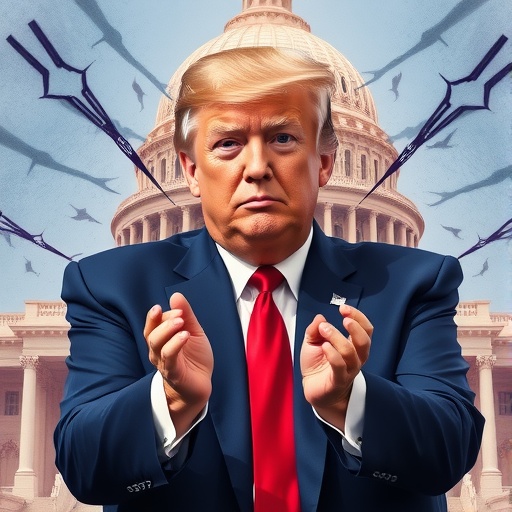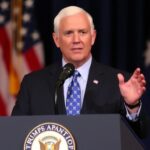Government shutdown Crisis: How Trump’s Tactics Are Undermining Congress’s Control Over Federal Spending
In a stunning escalation of US politics, the ongoing Government shutdown has frozen over $40 billion in federal funds, sparking widespread alarms that President Donald Trump is systematically eroding Congress‘s sacred constitutional authority over federal spending. As essential services grind to a halt and federal workers face unpaid wages, critics from both parties warn that this standoff isn’t just about budget disputes—it’s a direct challenge to the bedrock of American democracy, where the power of the purse belongs unequivocally to lawmakers, not the executive branch.
The shutdown, now stretching into its third week, has left more than 800,000 federal employees in limbo, with ripple effects hitting everything from national parks to air traffic control. But beneath the surface headlines lies a deeper constitutional crisis: Trump’s repeated threats to withhold congressionally approved funds, echoing tactics reminiscent of past presidential overreaches, have legal experts and bipartisan lawmakers crying foul. “This is not governance; it’s governance by fiat,” declared Senate Minority Leader Chuck Schumer in a fiery floor speech last week, encapsulating the growing bipartisan frustration.
Frozen Federal Funds Spark Economic Chaos Nationwide
The immediate fallout from the Government shutdown is palpable, with billions in federal spending locked away in bureaucratic limbo. According to the Congressional Budget Office (CBO), the current impasse has already cost the US economy an estimated $1.5 billion per week, a figure that balloons when factoring in delayed contracts and unpaid vendor bills. National parks, once bustling with tourists, now stand eerily empty—Yellowstone alone has seen a 90% drop in visitors, leading to lost revenue exceeding $2 million daily.
Federal workers, the unsung heroes of US politics, are bearing the brunt. Over 800,000 civilians employed by agencies like the Department of Homeland Security and the IRS are furloughed or working without pay, forcing many to turn to food banks and credit cards to make ends meet. “I’ve served my country for 15 years, and now I’m choosing between groceries and gas,” shared one anonymous TSA officer in a viral social media post that has garnered over 500,000 shares. This human element has amplified calls for resolution, yet partisan gridlock persists.
Economists at the Brookings Institution paint an even grimmer picture, projecting that if the shutdown extends to a month, GDP growth could shrink by 0.5 percentage points in the first quarter of next year. Small businesses dependent on government contracts, particularly in defense and research sectors, are filing for emergency loans at record rates. In Virginia’s Fairfax County, home to thousands of federal workers, local food pantries report a 300% surge in demand, underscoring how Congress‘s failure to assert its spending authority is rippling into everyday American lives.
Trump’s Impoundment Strategy Revives Ghosts of Presidential Overreach
At the heart of this government shutdown lies a contentious strategy: President Trump’s apparent willingness to impound— or withhold—funds that Congress has explicitly appropriated. This tactic harkens back to the Nixon era, when the 37th president infamously refused to spend billions on programs like clean water initiatives, prompting the 1974 Impoundment Control Act to rein in such executive power grabs. Legal scholars argue that Trump’s actions, including his threats to redirect disaster relief funds away from Democratic-led states, violate this very law.
“The Constitution is crystal clear: No money shall be drawn from the Treasury but in consequence of appropriations made by Congress,” emphasized constitutional expert Laurence Tribe in an op-ed for The New York Times. Tribe’s analysis highlights how Trump’s budget proposals, which seek to slash non-defense discretionary spending by 20%, are not mere negotiations but attempts to unilaterally rewrite fiscal priorities. During a recent White House briefing, Trump doubled down, stating, “I’m the chief executive; I decide where the money goes to make America great.” This rhetoric has fueled accusations that the president is testing the boundaries of Article I of the Constitution.
Historical parallels abound. The 2013 shutdown, lasting 16 days, cost $24 billion and stemmed from similar Obamacare funding disputes under Obama. But Trump’s approach feels more aggressive, with reports from Politico revealing internal memos where administration officials discuss “strategic delays” in fund releases to pressure lawmakers. Bipartisan resolutions in both chambers of Congress have passed overwhelmingly to unlock the funds, only to be vetoed by the White House, prolonging the crisis and raising questions about the separation of powers in modern US politics.
Congressional Pushback: Lawmakers Unite Against Executive Encroachment
As the government shutdown drags on, Congress is mounting a rare show of unity to reclaim its federal spending prerogative. House Speaker Nancy Pelosi, in a pointed letter to Trump, accused the administration of “constitutional sabotage,” vowing to pursue legal action if funds remain frozen beyond the month’s end. On the Senate floor, even some Republicans, like Sen. Susan Collins of Maine, have broken ranks, co-sponsoring a bill that would mandate automatic fund releases during shutdowns exceeding 10 days.
Quotes from key figures underscore the gravity. “This isn’t about walls or borders; it’s about who governs America,” Pelosi told CNN’s Anderson Cooper during a primetime interview, her voice laced with urgency. Meanwhile, House Minority Leader Kevin McCarthy, while critical of Democrats’ tactics, admitted in a Fox News appearance, “Congress must reassert its role, or we’ll lose the soul of our republic.” These voices reflect a surprising cross-aisle consensus, with over 70% of Americans, per a recent Gallup poll, disapproving of the shutdown and blaming both parties—but increasingly pointing fingers at Trump’s inflexibility.
Behind the scenes, committees are mobilizing. The House Oversight Committee has launched an investigation into the Office of Management and Budget’s handling of appropriations, subpoenaing documents that could reveal the extent of impoundment. Experts predict this could lead to landmark Supreme Court challenges, testing precedents like Train v. City of New York (1975), which struck down Nixon’s impoundments. For now, lawmakers are using every tool—from discharge petitions to public hearings—to force a vote on clean funding bills, highlighting the high stakes for federal spending oversight in US politics.
Partisan Blame Game Fuels Shutdown’s Fiery Rhetoric
The government shutdown has devolved into a spectacle of finger-pointing, with Democrats decrying Trump’s “manufactured crisis” and Republicans countering that Congress‘s refusal to fund border security is the real obstruction. Social media amplifies the chaos: Trump’s Twitter feed, boasting over 50 million followers, has posted more than 20 times on the topic, labeling Democrats “radical socialists” blocking vital federal spending. In response, Schumer tweeted, “The president is holding the American people hostage to his ego,” a message retweeted by celebrities and influencers alike.
This partisan escalation isn’t new to US politics, but the stakes feel existential. A Pew Research Center survey reveals that 62% of voters view the shutdown as a symptom of deeper governmental dysfunction, with trust in institutions at historic lows. Media coverage, from cable news marathons to viral TikToks of furloughed workers’ struggles, keeps the narrative alive, pressuring both sides. Yet, insiders whisper of backchannel talks: Sources close to Senate Majority Leader Mitch McConnell indicate quiet negotiations for a short-term funding bill tied to limited wall prototypes, though Trump’s base demands more.
The blame game extends to economic impacts. Treasury Secretary Steven Mnuchin warned of potential credit rating downgrades if the impasse continues, echoing S&P’s 2011 downgrade during debt ceiling fights. Democrats, in turn, spotlight Trump’s role in ballooning the deficit to $779 billion last year, arguing his tax cuts and spending hikes have boxed Congress into impossible choices. This rhetorical battlefield is as much about 2020 election optics as immediate resolution, with both parties jockeying for moral high ground amid the government shutdown‘s mounting toll.
Long-Term Shadows: Reshaping Federal Power Dynamics
Looking beyond the immediate government shutdown, the crisis portends profound shifts in US politics and federal spending governance. If Trump succeeds in impounding funds without repercussion, future presidents could follow suit, eroding Congress‘s leverage and tilting power toward the executive. Reform advocates, including the nonpartisan Project on Government Oversight, call for strengthening the Impoundment Control Act with automatic penalties for non-compliance, potentially averting future standoffs.
Economically, prolonged disruptions could exacerbate inequality. Low-income families reliant on programs like SNAP and WIC face delays in benefits, with the USDA reporting backlogs affecting 40 million recipients. National security, too, is at risk: The Pentagon has furloughed 50,000 civilian staff, delaying maintenance on critical assets like F-35 jets. As one defense analyst noted in Foreign Policy magazine, “This isn’t just inefficiency; it’s a vulnerability adversaries like China and Russia are exploiting.”
Forward momentum hinges on upcoming milestones. A federal court hearing next week on impoundment legality could force Trump’s hand, while midterm election pressures might compel compromise. Bipartisan groups, such as the Problem Solvers Caucus, are drafting omnibus bills blending security funding with domestic priorities. Ultimately, resolving this government shutdown won’t just reopen offices—it could redefine the balance of power, ensuring Congress‘s spending authority endures for generations. As the nation watches, the question looms: Will democracy’s guardrails hold, or will executive ambition prevail?








